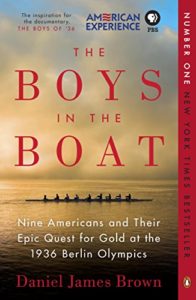Date: 23 April 2017
Location: Bonnie
We talked over a number of salient topics in this book. We were moved by the record of Joe Rantz’s hard knocks—expelled from family, supporting himself from his early years on. In fact all the crew members struggled with Depression poverty, holding part-time jobs in addition to their rowing workouts in order to stay in school. Candidates who grew up in easier circumstances dropped out. Their training demanded toughness and determination, rowing without regard for cold or rain.
We looked at the technicalities of rowing, especially concerning how the eight men were able to synchronize their strokes continually even during changes of tempo. In addition to the coxswain’s calling, the oarsmen’s close contact with the man in front and behind them, and their peripherial vision of each other’s sweeps, we noted the almost mystical sense of oneness that developed among them.
We noted Hitler’s Olympics as his ploy to advertise Germany as an upbeat, hospitable, and yet Aryan-victorious display. Remarkably Hitler’s show and publicity changed the Olympics for good, making it the world showcase that we know nowadays.
The Olympic race is the heart of the book, told to make us feel the suspense in spite of our knowing the outcome. The weather was harsh, particularly the head wind. Their stroke, Don Hume, was sick. The American crew were assigned the most difficult lane, in a move that violated the rules based on results from the qualifying heats. Toward the finish the crowd noise made it impossible for oarsmen to hear their cox, who fell to beating out the tempo on the hull with the wooden knockers on the tiller lines. Their tempo reached an incredible rate of 44 strokes per minute.
A final topic concerned the factuality of all details. The book is grounded in a great deal of source material, including news stories, the Leni Riefenstahl film, and the memories of Joe’s granddaughter. Granted, some details would have to have been created by the author. This book, however, should not be thought of as a historical novel. We agreed that the book is substantially factual, a dependable history of its events.
— John
